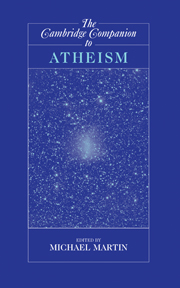Book contents
- Frontmatter
- General Introduction
- Part I Background
- Part II The Case against Theism
- 4 Theistic Critiques of Atheism
- 5 The Failure of Classical Theistic Arguments
- 6 Some Contemporary Theistic Arguments
- 7 Naturalism and Physicalism
- 8 Atheism and Evolution
- 9 The Autonomy of Ethics
- 10 The Argument from Evil
- 11 Kalam Cosmological Arguments for Atheism
- 12 Impossibility Arguments
- Part III Implications
- Index
- Series List
7 - Naturalism and Physicalism
from Part II - The Case against Theism
Published online by Cambridge University Press: 28 January 2007
- Frontmatter
- General Introduction
- Part I Background
- Part II The Case against Theism
- 4 Theistic Critiques of Atheism
- 5 The Failure of Classical Theistic Arguments
- 6 Some Contemporary Theistic Arguments
- 7 Naturalism and Physicalism
- 8 Atheism and Evolution
- 9 The Autonomy of Ethics
- 10 The Argument from Evil
- 11 Kalam Cosmological Arguments for Atheism
- 12 Impossibility Arguments
- Part III Implications
- Index
- Series List
Summary
Naturalism and physicalism are metaphysical positions commonly associated with atheism. Both are stronger than atheism: they entail atheism, conceived (minimally) as the denial that there is an all-powerful, omniscient, perfectly good disembodied personal being who has created the physical universe. Naturalism and physicalism are, therefore, natural allies of atheism, and offer a philosophical framework within which atheism finds a natural home.
PHYSICALISM
Main Positions on the Mind/Body Problem
Physicalism may be understood, roughly, as the claim that minds are not distinct from matter and hence cannot exist apart from it. There are many varieties of physicalism. They may be graded, from most “extreme” to least, as follows.
eliminative materialism. On this view, there simply are no mental events, and no “inner theater.” Subjective experience is an illusion; all that is happening “in our heads” are neurochemical events in our brains.
reductive materialism. This view allows that there are mental events, but holds that each mental event type is identical with a physical event type in the brain.
supervenience theories. Supervenience is a relation that holds between a physical and a mental state just in case it is necessary that when that physical state obtains, so does the mental state. A supervenience theorist could hold, for example, that each instance (token) of a certain mental state type is identical to an instance of some physical state type, without holding that the two state types can be identified. For example, those who maintain that mental characteristics are functional properties often subscribe to such a view. There are those (such as Hilary Putnam) who define functional states in terms of their logical role in the execution of a computation (i.e., the formal states a computer is in when it executes a program) or those (such as David Lewis) who define them in terms of the causal role of the state.
property dualism. Property dualists deny that mental properties are in any sense identical to physical properties. They may hold, however, that there are only material substances, some of which have mental properties. It is not clear in what principled way one ought to distinguish mental from physical properties. A property dualist may further hold that the instantiation of mental properties by a material thing is strongly dependent on which physical properties it has: that the relation between the instances is either one of nomological (lawlike) necessity or one of metaphysical necessity.
- Type
- Chapter
- Information
- The Cambridge Companion to Atheism , pp. 118 - 134Publisher: Cambridge University PressPrint publication year: 2006
- 2
- Cited by



